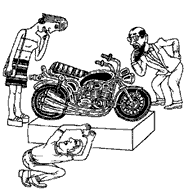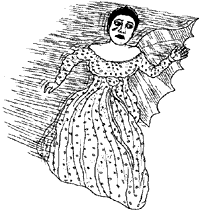
Art
"The Art of the Motorcycle" (The Guggenheim Museum, New York City). Besting Rauschenberg and Matisse retrospectives, the museum's display of 114 motorcycles is the most attended exhibition in its history. Some critics find beauty in the bikes' sleek, modern designs, but most reject the exhibition as lowbrow. The New Republic's Jed Perl calls it a "pop nostalgia orgy masquerading as a major artistic statement." (Visit the Guggenheim's home page.)
Television
Lolita (Showtime; click here for air times). Despite the refusal of major distributors to release it as a theatrical film, Fatal Attraction Director Adriane Lyne's adaptation of Vladimir Nabokov's novel is deemed boring rather than shocking. More faithful to the novel than Stanley Kubrick's 1962 version, it is nonetheless said to lack Nabokovian wit and sexiness. A minority praises Jeremy Irons' portrayal of Humbert Humbert--the middle-age professor obsessed with his adolescent stepdaughter--as sufficiently smarmy, and call the film "rich beyond what anyone could have expected" (Caryn James, the New York Times). (Read Louis Menand's review in Slate.)
Maximum Bob (ABC; Tuesdays, 10 p.m. ET/PT). Yet another adaptation of an Elmore Leonard novel produced by Barry Sonnenfeld (Get Shorty, Out of Sight). This one centers on a power-hungry rural judge (Beau Bridges) who happily doles out lengthy sentences--a "redneck Judge Judy" (Bruce Fretts, Entertainment Weekly). Critics call it the next Twin Peaks, citing its twisting plot lines, eccentric characters, and black humor. Dissenting, the Washington Post's Tom Shales calls the show's jabs at yokels "smug and snide." (Go to the official ABC site.)

Movies
Ever After: A Cinderella Story (20th Century Fox). An update of the fairy tale, with Drew Barrymore as the maligned princess and Anjelica Huston as the social-climbing stepmother. Critics applaud Huston's wicked performance and the renovations to the tale--this Cinderella is erudite, resourceful, and independent. The film is said to be "the best Cinderella movie ever" (Mick LaSalle, the San Francisco Chronicle), though politically minded critics call it "a preposterous polemic celebrating modern feminist platitudes" (Gary Arnold, the Washington Times). (Here's the official site.)
The Negotiator (Warner Bros.). A rare flop for the great character actors Kevin Spacey and Samuel L. Jackson. The latter plays a cop who takes another cop hostage, then picks Spacey as his negotiator. The actors are unable to compensate for one-dimensional characters, trite dialogue, and an overabundance of explosions. According to Time's Richard Schickel, "The main things lost in the hubbub are wit and logic." (Check out the official Web site.)
Book
Burn Rate: How I Survived the Gold Rush Years on the Internet,by Michael Wolff (Simon & Schuster). A reporter's memoir about his own unsuccessful attempt at running an Internet startup. Critics revel in his caustic humor and vengeful gossip about new-media moguls (he describes one AOL exec as "a fat man, an ugly man, sweating like crazy"). Business Week's Amy Cortese calls the book "a fascinating cautionary tale" of the way money is shoveled at bad, but hyped, projects. But Slate's Jack Shafer disparages widespread comparisons of Burn Rate to Michael Lewis' Liar's Poker and attacks what he deems Wolff's disingenuousness: "[B]y repeatedly reminding the reader of what a dishonest, scheming little shit he is, he seeks to inflate his credibility." (Read Shafer's review.)
Death
Jerome Robbins (1918-1998). Obituaries rank the choreographer alongside Diaghilev and Balanchine as one of the men who reinvented ballet. Best known for his Broadway musicals West Side Story and Fiddler on the Roof, his greatest contribution is said to be the integration of Modernist innovations and popular dance steps with classical ballet. He was "America's first great native born ballet choreographer" (Terry Teachout, Time). Critics remember his unrelenting perfectionism (some say meanness) and his audacious style, which "typified the make-way-for-youth spirit of the era" (Arlene Croce, The New Yorker).
Recent "Summary Judgment" columns
Book--The Modern Library's 100 Best English-Language Novels Since 1900;
Book--Point of Origin, by Patricia Cornwell;
Movie--Disturbing Behavior;
Movie--Pi;
Movie--The Thief.
Movie--The Mask of Zorro;
Movie--Saving Private Ryan;
Movie--There's Something About Mary;
Music--Hello Nasty, by the Beastie Boys;
Book--Lucky Bastard, by Charles McCarry;
Theater--Twelfth Night;
Television--Drudge (Fox).
Tina!--The Tina Brown Years;
Art--"Unknown Terrain: The Landscapes of Andrew Wyeth";
Movie--Small Soldiers;
Movie--Lethal Weapon 4;
Movie--Buffalo 66;
Music--Embrya, by Maxwell;
Music--Car Wheels on a Gravel Road, by Lucinda Williams.
Movie--Armaggedon;
Movie--HenryFool;
Death--Roy Rogers;
Book--Explaining Hitler: The Search for the Origins of His Evil, by Ron Rosenbaum;
Book--Someone Else's House: America's Unfinished Struggle for Integration, by Tamar Jacoby;
Book--Bridget Jones's Diary, by Helen Fielding;
Performance Art--The Return of the Chocolate Smeared Woman, Karen Finley.
--Eliza Truitt